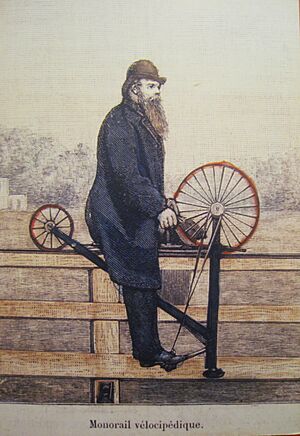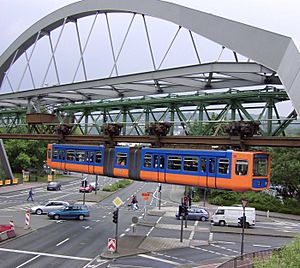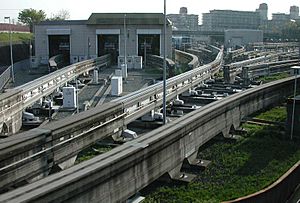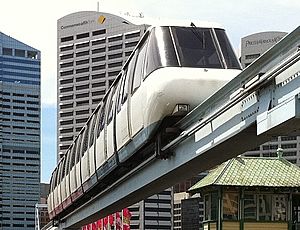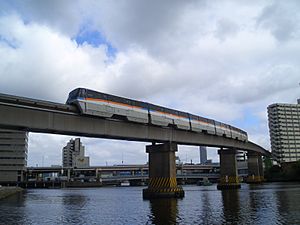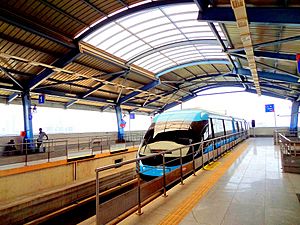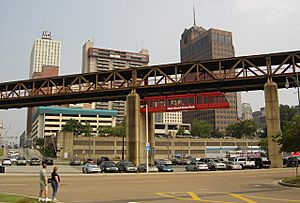Monorail facts for kids
A monorail is a special type of train that runs on just one rail. Unlike regular trains that use two rails, a monorail balances on a single, strong beam. They are often used to move people around big cities or places like amusement parks and airports. Some monorails even use magnets to float above their rail, which helps them move very smoothly and quickly. The first monorail was invented a long time ago, in the 1800s.
Contents
How Monorails Work
Modern monorails use a large, solid beam as the path for the vehicles. There are two main types of monorails: straddle-beam and suspended monorails.
The most common type is the straddle-beam. In this design, the train sits on top of a steel or concrete beam that is about 2 to 3 feet wide. The train has rubber-tired wheels that grip the top and sides of the beam. This helps the train move forward and stay stable. A German company called ALWEG made this style very popular.
Another type is the suspended monorail. Here, the train cars hang below the wheels, and the wheels run inside a single beam. The Chiba Urban Monorail in Japan is the biggest suspended monorail system in the world.
There's also an older type of suspension monorail that was created in Germany in the 1880s. One famous example, the Wuppertal Schwebebahn, opened in 1901 and is still running today!
How Monorails Get Power
Most modern monorails run on electric motors. They get their electricity from special rails or wires attached to their beams. However, some monorail systems can also use diesel fuel. In the past, some monorails, like the Lartigue Monorail, even used steam engines!
Monorails That Float: Maglev Trains
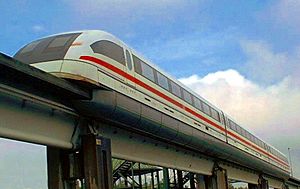
Some monorails use magnetic levitation, or "maglev" for short. These trains use powerful magnets to float above their track. This means there's no rubbing between the train and the track, which allows them to go incredibly fast.
The German Transrapid maglev system is an example of a very fast monorail. The experimental SCMaglev train has reached an amazing speed of 603 kilometers per hour (375 mph)! The commercial Shanghai Maglev Train can go up to 501 kilometers per hour (311 mph). There are also slower maglev monorails, like Japan's Linimo, which are used for city travel.
How Monorails Change Tracks
Early monorails, like the one in Wuppertal, Germany, found it hard to switch from one track to another. Some monorails avoid this problem by running in a continuous circle or just between two stations, like the Seattle Center Monorail.
Today, monorails can switch tracks much more easily. For suspended monorails, special parts inside the beam can move to guide the train onto a different line.
For straddle-beam monorails, the entire beam has to move to switch tracks. This used to be very difficult. Now, a special moving platform helps align different beam sections. This allows the train to smoothly switch directions. The ALWEG design can even complete a switch in just 12 seconds!
Sometimes, instead of a switch, a monorail might use a turntable. This is a section of track that can spin around to connect to different tracks. This is useful for moving trains into storage or maintenance areas. The old Sydney Monorail used a similar system to swap trains at its depot.
Going Up Hills
Monorails with rubber tires are usually designed to handle slopes of about 6%. Other rubber-tired trains, like those in the Lausanne Metro or Montreal Metro, can handle similar or even steeper hills. For example, the Lausanne Metro has slopes up to 12%!
Images for kids
-
The original Red Mark I Disneyland Monorail at the Disneyland Hotel station in August 1963.
-
The Seattle Monorail was built in 1962 and still uses its original ALWEG trains.
See also
 In Spanish: Monorriel para niños
In Spanish: Monorriel para niños


